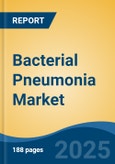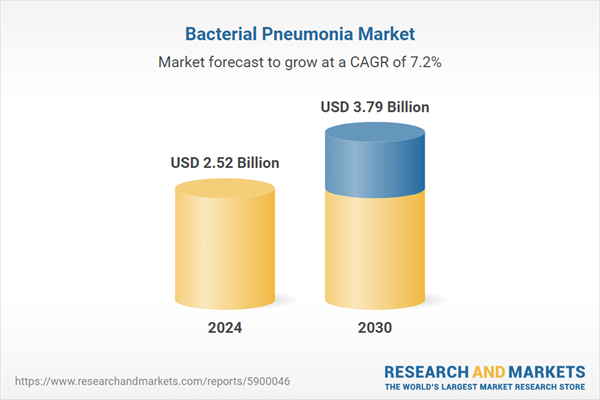Speak directly to the analyst to clarify any post sales queries you may have.
10% Free customizationThis report comes with 10% free customization, enabling you to add data that meets your specific business needs.
This market is shaped by several key factors, including the rising incidence of bacterial pneumonia, advancements in medical research and technology, and evolving healthcare policies worldwide. Bacterial pneumonia remains a significant global health concern, affecting individuals of all ages, with a particular impact on children, the elderly, and individuals with compromised immune systems. Factors such as smoking, chronic respiratory conditions, and exposure to environmental pollutants contribute to its prevalence. The market focuses on addressing these challenges by developing effective vaccines, diagnostic tools, and therapeutic interventions.
Key Market Drivers
Rising Incidence of Bacterial Pneumonia
The global bacterial pneumonia market is witnessing a significant boost due to the rising incidence of bacterial pneumonia worldwide. Bacterial pneumonia, a potentially life-threatening respiratory infection caused by various bacterial pathogens, has become increasingly prevalent in recent years, contributing to the growing demand for prevention, diagnosis, and treatment solutions within this healthcare sector. For instance, according to a 2024 National Center for Immunization and Respiratory Diseases article, Mycoplasma pneumoniae infections are rising, highlighting the need for increased awareness, timely diagnosis, and effective treatment to manage this growing public health concern.Several factors contribute to the escalating incidence of bacterial pneumonia. One key factor is the aging global population, as elderly individuals and those with weakened immune systems are more susceptible to pneumonia. As the world's population continues to age, the number of people at risk of contracting bacterial pneumonia increases, leading to a greater need for healthcare services and products related to this infectious disease.
The lifestyle factors such as smoking, chronic respiratory conditions, and exposure to environmental pollutants contribute to the higher incidence of bacterial pneumonia. These risk factors are prevalent in many parts of the world, further fueling the demand for healthcare interventions. The ongoing COVID-19 pandemic has also had an indirect impact on the rising incidence of bacterial pneumonia. While COVID-19 itself is a viral respiratory infection, the pandemic has highlighted the importance of respiratory health and infection prevention. As a result, individuals are becoming more vigilant about their respiratory health, seeking medical attention for respiratory symptoms, and adopting preventive measures. This increased awareness and healthcare-seeking behavior have led to earlier diagnosis and treatment of bacterial pneumonia cases, further contributing to the market's growth.
The global bacterial pneumonia market is experiencing an upward trajectory driven by the escalating incidence of this infectious disease. Demographic factors, lifestyle choices, and the heightened awareness of respiratory health due to the COVID-19 pandemic all play pivotal roles in boosting the demand for bacterial pneumonia-related healthcare services and products.
Key Market Challenges
Antibiotic Resistance
Antibiotic resistance has emerged as a formidable challenge hindering the global bacterial pneumonia market, threatening the effectiveness of treatment and posing a significant public health concern. Bacterial pneumonia, a common and potentially life-threatening respiratory infection caused by various bacterial pathogens, relies heavily on antibiotics for treatment. However, the alarming rise of antibiotic-resistant strains of these bacteria is undermining the ability to combat this disease effectively.The rise of antibiotic resistance in bacterial pneumonia is primarily attributed to the overuse and misuse of antibiotics. Antibiotics, once hailed as miracle drugs, have been prescribed excessively for respiratory infections, often when they are not necessary, contributing to the development of resistance. This overreliance on antibiotics has accelerated the evolution of bacterial pathogens, making them less responsive to conventional treatments.
One of the critical consequences of antibiotic resistance is the limited pool of effective antibiotics available for treating bacterial pneumonia. The bacteria responsible for this infection, such as Streptococcus pneumoniae and Haemophilus influenzae, have developed resistance to multiple antibiotic classes, leaving healthcare providers with fewer treatment options. Patients with antibiotic-resistant bacterial pneumonia may experience prolonged illness, increased hospitalizations, and higher mortality rates.
Key Market Trends
Advancements in Vaccine Development
Advancements in vaccine development have emerged as a significant driving force behind the growth of the global bacterial pneumonia market. Bacterial pneumonia, caused by various bacterial pathogens, has long been a major global health concern, particularly affecting vulnerable populations such as children and the elderly. Recent innovations in vaccine development are proving to be a game-changer in the fight against this life-threatening respiratory infection. One of the most noteworthy trends in the bacterial pneumonia market is the continuous improvement and expansion of vaccine options. Vaccines targeting key bacterial pathogens responsible for pneumonia, such as Streptococcus pneumoniae and Haemophilus influenzae type b, have undergone substantial advancements. These vaccines are designed to prevent infection, reduce the severity of pneumonia cases, and lower the risk of complications.Childhood immunization programs have played a pivotal role in the adoption of these vaccines, with many countries incorporating them into their routine vaccination schedules. This widespread vaccination coverage has resulted in a decline in pneumonia-related hospitalizations and mortality among children, which is a significant public health achievement. Moreover, advancements in vaccine development have led to the creation of conjugate vaccines that offer broader protection against multiple bacterial strains. These vaccines have proven effective in reducing the incidence of bacterial pneumonia caused by various serotypes of the same bacterial species, contributing to improved outcomes and a decrease in antibiotic-resistant strains.
Key Market Players
- Innoviva Inc
- Pfizer Inc.
- Merck & Co., Inc.
- Melinta Therapeutics LLC
- Evopoint Biosciences
- Aridis Pharmaceuticals Inc.
- Cumberland Pharmaceuticals Inc.
- Eagle Pharmaceuticals, Inc.
- Clarametyx Biosciences
- Basilea Pharmaceutica Ltd
Report Scope:
In this report, the Global Bacterial Pneumonia Market has been segmented into the following categories, in addition to the industry trends which have also been detailed below:Bacterial Pneumonia Market, By Type:
- Community-Acquired Pneumonia (CAP)
- Hospital-Acquired Pneumonia (HAP)
Bacterial Pneumonia Market, By Treatments:
- Vaccines
- Drugs
Bacterial Pneumonia Market, By Route of Administration:
- Oral
- Subcutaneous
- Other
Bacterial Pneumonia Market, By Distribution Channel:
- Hospital Pharmacies
- Retail Pharmacies
- Online Pharmacies
Bacterial Pneumonia Market, By Region:
- North America
- United States
- Canada
- Mexico
- Europe
- France
- United Kingdom
- Italy
- Germany
- Spain
- Asia-Pacific
- China
- India
- Japan
- Australia
- South Korea
- South America
- Brazil
- Argentina
- Colombia
- Middle East & Africa
- South Africa
- Saudi Arabia
- UAE
Competitive Landscape
Company Profiles: Detailed analysis of the major companies present in the Global Bacterial Pneumonia Market.Available Customizations:
With the given market data, the publisher offers customizations according to a company's specific needs. The following customization options are available for the report.Company Information
- Detailed analysis and profiling of additional market players (up to five).
This product will be delivered within 1-3 business days.
Table of Contents
Companies Mentioned
- Innoviva Inc
- Pfizer Inc.
- Merck & Co., Inc.
- Melinta Therapeutics LLC
- Evopoint Biosciences
- Aridis Pharmaceuticals Inc.
- Cumberland Pharmaceuticals Inc.
- Eagle Pharmaceuticals, Inc.
- Clarametyx Biosciences
- Basilea Pharmaceutica Ltd
Table Information
| Report Attribute | Details |
|---|---|
| No. of Pages | 188 |
| Published | March 2025 |
| Forecast Period | 2024 - 2030 |
| Estimated Market Value ( USD | $ 2.52 Billion |
| Forecasted Market Value ( USD | $ 3.79 Billion |
| Compound Annual Growth Rate | 7.1% |
| Regions Covered | Global |
| No. of Companies Mentioned | 10 |









